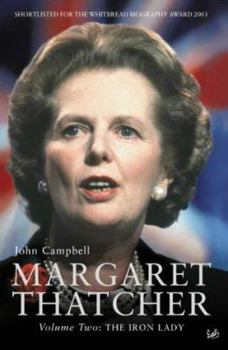Margaret Thatcher, Volume 2: The Iron Lady
(Book #2 in the Margaret Thatcher Series)
Select Format
Select Condition 
Book Overview
John Campbell's second volume covers the years of Margaret Thatcher's momentous premiership. Thirteen years after her removal from power, this is the first comprehensive and fully researched study of... This description may be from another edition of this product.
Format:Paperback
Language:English
ISBN:0712667814
ISBN13:9780712667814
Release Date:September 2004
Publisher:Pimlico
Length:913 Pages
Weight:1.55 lbs.
Customer Reviews
2 ratings
Thatcher should be every girl's heroine
Published by Thriftbooks.com User , 18 years ago
The mid-90's pop band Spice Girls called the ultimate Girl Power as Margaret Thatcher. The British singers were on the money because Thatcher was a revolutionary Prime Minister. She kept her own counsel and could not be manipulated by the popularity polls. This account of her political career is the ultimate study in what Henry Kissinger once said "power is the ultimate aphrodisiac". Churchill and Thatcher proved that Britain produced two formidable leaders who survived Machiavellian daggers over and over again and got their way before being ousted.
A Woman of No Impotence
Published by Thriftbooks.com User , 19 years ago
While she was still Leader of the Opposition, Margaret Thatcher paid a visit to Yugoslavia, where she had a meeting with President Tito. The conversation turned to China, where Chairman Mao's widow had recently been stirring up trouble for the leadership. Tito remarked that he disapproved of women interfering in politics. "I don't interfere in politics, " declared his guest, eyes ablazing, "I AM politics." Therein can be found both the secret of Margaret Thatcher's success and the seeds of her downfall. Her supreme confidence helped overcome widespread doubts that a woman could lead her party and her country, but in the end her arrogance alienated the very people she needed to retain power. Thatcher's story presents a unique challenge to political biographers, largely because her overpowering personality and strident views make a fair assessment difficult to achieve. The writer has to tread a fine line between hagiography and demolition job. Happily, John Campbell's book manages to avoid these pitfalls, and his account of Thatcher's life and times is even-handed, thorough and highly readable. The first volume of Campbell's biography - The Grocer's Daughter - covered Thatcher's early life and career, concluding with her arrival on the threshold of Number Ten. This second volume concentrates on her entire eleven-and-a-half years as mistress of Downing Street, as well as the aftermath of her removal from power. The first thing to say is that it's a huge read - over 800 pages. But this is no more than the subject deserves, given Thatcher's dominance, not only in her role as Prime Minister, but also as an inveterate meddler in the work of her ministers. From health and education to local government finance and foreign affairs, there was barely an aspect of policy which Margaret Thatcher did not seek to influence. All the important events of her premiership are there - the three election victories, the Falkands, Westland, the miners' strike, the Poll Tax, and her dramatic departure at the hands of her own party. But the book goes beyond the big stories to put her premiership in a wider context. Take housing: Campbell shows that Thatcher's policy of encouraging council tenants to buy their own homes, while prohibiting local authorities from building new houses with the proceeds, led to a massive shortage of affordable housing, and by extension to the high numbers of homeless people still seen on British streets today. Campbell's thorough research shines brilliantly throughout the book, but U.S. readers may find this depth of detail just too much information to take in. During some passages, even my eyes started to glaze over at so many references to obscure events and personalities from Britain's political past. Of greater interest may be the sections covering Thatcher's dealings with Ronald Reagan. Thatcher apologists often claim that Britain's standing in the world grew taller as a result of her strong support for the U.S. President.





